|
|
|
Sort Order |
|
|
|
Items / Page
|
|
|
|
|
|
|
| Srl | Item |
| 1 |
ID:
137519
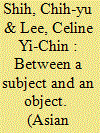

|
|
|
|
|
| Summary/Abstract |
Late Pao-kun Kuo in Singapore and contemporary Denny Yung in Hong Kong have made articular ontological and epistemological choices in their experimental theater in the context of the de-colonization and rise of China. We gather, between the two sites, a possible dichotomy in the representation of China: China as a collective subject to accommodate the changing world and China as an individualized object that emerges in each narrator’s chosen perspective. Kuo intends to prompt the audience to reconnect with something greater than their individuality. For Kuo, the crisis is the loss of cultural subjectivity and the privileging of transcendence over individualized meanings of life. For Yung, cultural subjectivity is no longer a question after the return of Hong Kong to China. Yung painstakingly generates the legitimacy and capacity of individual Hong Kong people to have faith in their own ways of transcending any version of the entirety of China
|
|
|
|
|
|
|
|
|
|
|
|
|
|
|
|
| 2 |
ID:
137520
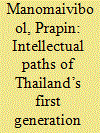

|
|
|
|
|
| Summary/Abstract |
This article studies the oral history interviews of two China scholars in Thailand by drawing upon each scholar’s encountering and choices. The focal points of the interviews are placed on their professional as well as social and on their local as well as international encountering with Chinese that shaped their choices and consequently their different intellectual paths and contribution to the knowledge and understanding of China in Thailand. The analysis compares and contrasts the factors similar and different to the first generation China scholars in Thailand.
|
|
|
|
|
|
|
|
|
|
|
|
|
|
|
|
| 3 |
ID:
137515


|
|
|
|
|
| Summary/Abstract |
Scholarship on humanities in Southeast Asia done by Chinese descendants is significantly different from the work of diasporic Chinese scholars in North America. The latter is divided by strategic choices of scholars as to how to represent Asian and Chinese Americans, who presumably struggle for recognition and equality in the Anglo-Saxon mainstream. Several nstances have shown an unwanted sense of inferiority. Scholarship of one choice may inadvertently expose, arouse, or reproduce this sense of inferiority among those scholars making a different choice.
|
|
|
|
|
|
|
|
|
|
|
|
|
|
|
|
| 4 |
ID:
137521


|
|
|
|
|
| Summary/Abstract |
The conflation of ethnic and religious identities, particularly that of Malay and Muslim, has long historical and political roots in Malaysia. Being one of the most safeguarded identity marks in Malaysia, Islam has become part of the core of Malay ethnicity and plays a prominent role in ethnic politics. Muslim converts from ethnic minorities, such as the Chinese and Indians, are therefore faced with social expectation and pressure to ‘become Malay’. This paper discusses the difficulty and improbability of Chinese Muslim identity in the previous literature and the recent development that enables the decoupling of religious and ethnic identities. By looking beyond ethnicity, the most salient social divider in Malaysia, and looking into other possibilities, such as religious identity, this paper aims to paint a picture of social relations and identification that is more complex yet flexible amongst the Chinese Muslim converts in Penang.
|
|
|
|
|
|
|
|
|
|
|
|
|
|
|
|
| 5 |
ID:
137522
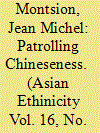

|
|
|
|
|
| Summary/Abstract |
In combination with their strategy to recruit foreign talent, Singaporean state authorities have increasingly focused their attention on community integration schemes for Chinese professional newcomers. The government facilitated such integration with the creation of the Kowloon Club in 1990. The Kowloon Club is not only a government experiment that has been repeated three times since then, but also the only new migrant association that does not explicitly target Mainlanders. Through in-depth interviews with the Club’s leadership, I explore the ethnic adaptation of the Kowloon Club membership as it negotiates the evolving sense of Chineseness found in state designs and Singaporean society. Much like the emergence of the 1997 Hong Kongese identity, the Kowloon Club’s activities have shifted in strong reaction to the racialized category put forth by state authorities and embodied by Mainlander professionals in that the Club’s activities now symbolize and help patrol what Chineseness means as everyday performance in the city-state.
|
|
|
|
|
|
|
|
|
|
|
|
|
|
|
|
| 6 |
ID:
137516
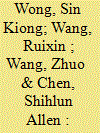

|
|
|
|
|
| Summary/Abstract |
In Singapore, intellectuals, especially those in media and education, are considered as the driving force of formatting public opinion over the social imagination of China and Chineseness. This article, largely based on oral histories of some Singaporean scholars and media professionals and memoirs of related figures, analyzes the choice and acquisition of their knowledge on China. Through the analysis and comparison of their construction of knowledge on China, this article also discusses the accuracy of their understanding of China and how such understandings were formed along with their personal experiences from domestic socialization, education, and professional accumulation. The authors consequently map out the process of how public intellectuals from mass media and academia transform their knowledge imagination of China into the professional opinions that help to reconstruct and shift Singaporean’s impression and understandings of China.
|
|
|
|
|
|
|
|
|
|
|
|
|
|
|
|
| 7 |
ID:
137518
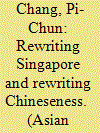

|
|
|
|
|
| Summary/Abstract |
This study proposes to view Lee Guan Kin (the former director of the Center for Chinese Language, Culture, and Division of Chinese at Nanyang Technological University) in the historical context in which the identity of Southeast Asian Chinese has transformed from overseas Chinese to ethnic Chinese, from Straits Chinese to Chinese Singaporeans. Based on the interview with Lee and the study of Lee’s numerous publications, this article exemplifies Lee’s enduring efforts on researching diasporic Southeast Asian Chinese and their ties with Chinese language and culture is a meaningful choice rather than an essentialist returning to ‘roots.’ In this article, Lee’s continuous engagement with China, Chinese language, and culture is illustrated by analyzing Lee’s assertion of ‘doing justice’ for Lim Boon Keng and Tan Lark Sye. Accordingly, this study is divided into four parts. First, the concept of Chineseness is reviewed and explored in the context of Southeast Asia. Second, the historical background of English-educated and Chinese-educated Chinese groups and their varying degrees of Chineseness are introduced. Then this study analyzes how Lee does justice for Lim Boon Keng, a baba who served as chancellor of Xiamen University for 16 years, and Tan Lark Sye, who was the founder of former Nanyang University. Lee believes that both prominent figures were unfairly and relentlessly treated by Chinese and Singaporean historiography, respectively, and therefore, Lee wants to do justice to them as a way to relocate their position in the context of Chinese diaspora and to redefine Chinese accordingly. Finally, this study argues that locality defines Lee’s Chineseness, her relation with China, China studies, Chinese identity, or Chinese culture. While locality defines Lee’s Chineseness, a diasporic stance characterizes her articulation, which challenged the homogeneous threat of identity imposed by the nation-state and the kind of Chineseness traditionally shaped by the authority of a sino-centric core.
|
|
|
|
|
|
|
|
|
|
|
|
|
|
|
|
|
|
|
|
|